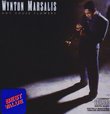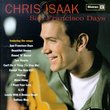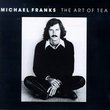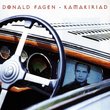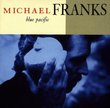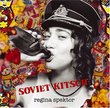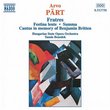| All Artists: Lee Konitz, Brad Mehldau, Charlie Haden Title: Alone Together Members Wishing: 2 Total Copies: 0 Label: Blue Note Records Original Release Date: 11/4/1997 Release Date: 11/4/1997 Album Type: Live Genres: Jazz, Pop Styles: Cool Jazz, Modern Postbebop, Bebop Number of Discs: 1 SwapaCD Credits: 1 UPCs: 724385715020, 0724385715051, 724385715051 |
Search - Lee Konitz, Brad Mehldau, Charlie Haden :: Alone Together
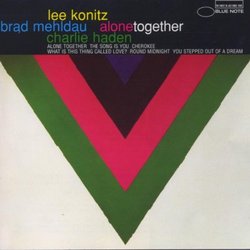 | Lee Konitz, Brad Mehldau, Charlie Haden Alone Together Genres: Jazz, Pop
Lee Konitz is one of the great and genuine improvisers, a musician who can be counted on to take risks, striving to invent in the moment. In these live recordings from Los Angeles's Jazz Bakery, he's heard exploring famili... more » |
Larger Image |
CD DetailsSynopsis
Amazon.com Lee Konitz is one of the great and genuine improvisers, a musician who can be counted on to take risks, striving to invent in the moment. In these live recordings from Los Angeles's Jazz Bakery, he's heard exploring familiar standards that have long been part of his repertoire, but every phrase seems newly minted by Konitz's dry sound and his slightly hesitant, always searching, line. Tunes that often receive pat performances, like "Cherokee" and "Round Midnight," appear here as unknown terrains. Veteran bassist Charlie Haden displays the intense listening skills that distinguish his playing, shadowing Konitz's invention and anchoring the harmony. Pianist Brad Mehldau, a rising star, extends his musical reach here, accepting Konitz's terms and playing jazz in its most naked and challenging form. --Stuart Broomer Similarly Requested CDs
|
CD ReviewsMeditative standards-playing from Konitz 10/11/1998 (4 out of 5 stars) "Six standards that have been touchstones of Konitz's career, recorded by a quiet and intimate trio (Konitz, Charlie Haden and the pianist Brad Mehldau). Konitz's improvisations here are as focused and closely-thought-out as ever; equally a delight are his thoughtful renditions of the melodies. Check out "Round Midnight", where the tune is only present as the familiar phrase-rhythms, while Konitz fills them with new lines. Konitz was once quoted in an interview as to his concept of "levels" in improvisation--ranging from the pure statement of a melody to elaborations on it to making up new melodies--and that he felt all were equally valid. This recording is a particularly clear example of this credo.So why just 4 stars? First: four of the improvisations get truncated by an artificial fadeout. One can't blame stupid producers for this decision: Haden & Konitz produced the album themselves. This feature is particularly irritating on "What is this Thing..." where Konitz's own composition written on its changes, "Subconscious-Lee", gets cut off as he states it.Second: Brad Mehldau is, to my ears, grossly inappropriate for this album. His solos are all of a piece: instantly doubletimed, with call-and-response patterns built up between both hands with maddening predictability from a repeated phrase. This does little besides showing one that Mehldau is adept at transposition and has little sense of when to stop. Konitz has a knack for fitting in in the most unexpected of contexts--he's performed with Derek Bailey and Ornette Coleman--but it looks like Mehldau needs to learn this trick too.These flaws are not serious enough to detract from a fine Konitz performance, however. Recommended." Chamber jazz- a Lee Konitz showcase. 04/21/1999 (4 out of 5 stars) "The album title says it all-this album does sound at times like the 3 participants are not listening to each other. This is a live recording from December 96.Haden(bass),Konitz(alto) and Mehldau(piano) work through 6 standards at the Jazz Bakery in L.A. . Konitz alone or with Haden is everything you would expect.He has no fear of taking risks,turning the tune inside-out and searching all over for the beauty in the interplay.It is often calm and unrushed- just riveting music by two absolutely top-class players.The music only heats up and swings in the conventional sense when piano and bass take off together.It jars a bit in this context and sounds like Brad Mehldau has been noodling away in the background waiting to be let off the leash.And away he goes at double quick time but it is not really a development on what went before. When all 3 play together the result is strange-Mehldau is languid and unable to get into the exchanges.Konitz and Haden bounce ideas off each other but Mehldau is somewhere else. Still, it is a fine record .Konitz on the tightrope again and perfectly balanced throughout in spite of all the leaps and jumps of his adventurous playing. Some sets at the Jazz Bakery were played by the Konitz /Haden duo and the results are on "Sweet &Lovely" on King Records." Not worth the money B | 03/15/2004 (2 out of 5 stars) ""Lee Konitz? Mehldau? Charlie Haden? This is gonna KILL!" These were my words when I learned of this record's existence. I couldn't wait to hear these three independent minds find common ground on what looked from the back cover to be unique explorations of the American songbook. "Lee Konitz, Mehldau, and Haden? THIS?"
These were my words after I listened, a few times over, I might mention, to this outing. Let me be straight here: I am a huge Lee Konitz fan. I'm an even bigger Mehldau fan, and how could you not appreciate Charlie Haden, the really first avant-bassist in the music? But what I found with this record is, to me, a half-assed run-through of standards by guys who would rather be doing something else. I am not here to trash these musicians, but to warn you out there: don't be fooled by the cover. This should not have been recorded, it just wasn't the right day. Konitz's work to me is the least inspired of the bunch: safe, predictable and tired. His sound is strikingly stark, as always, and he displays his uniqueness in every note, but the notes themselves...leave alot to be desired. Konitz's solos seem to be the weight, the heaviness that pulls Mehldau and Haden down to their least-inspired accompaniments heard to date. Instead of giving these standards an entirely new spin together, they opt for the easy way out (especially Konitz), and the audience responds accordingly, with half-hearted enthusiasm.Honestly the parts of the record that bear repeated listening are Mehldau's fascinating forays into solo piano virtuosity of the highest caliber. From the first note of his solos, the difference in creativity and energy between him and Konitz (who is inevitably the first soloist on EVERY track) is striking. Every solo is constructed perfectly and to the highest level of his genius, as if reacting to the sleepy atmosphere in a burst of everything he's got. And how could you blame him? Haden's stoic bass solos are sublime, of course, but even he never lets loose with the kind of gutsy abandon he's capable of. And what's with the amp? I mean I know it was the mid-'90s but good God! Turn down! I want to hear the bass not the Gallien-Krueger!Again, I didn't come here to bash anyone. Don't buy this album unless it's to transcribe or behold in awed silence the genius of Brad Mehldau's solos. Trust me on this one, there are better examples of EVERYONE to check out." |

 Track Listings (6) - Disc #1
Track Listings (6) - Disc #1